|
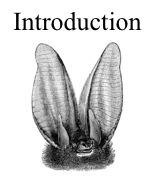
 Listen Listen
Podcasting
can seem a mite intimidating. Pod... cast? When I first heard
the word I imagined something either sort of hard-shelled and
outer-spacey or maybe sitting at the edge of a pond, tiddlywinking
peas.
A "podcast" is just an on-line audio (and, less commonly,
video) file. It could be of a deeply probing interview; a bunch
of kids singing "Kumbaya"; or, say, you reading from
your novel. It could be a single file—your reading on March
17, 2013, or, say, a radio show-style series of interviews with
fellow horror novelists, one posted each Saturday upon the toll
of midnight. It's a wild bouquet of possibilities.
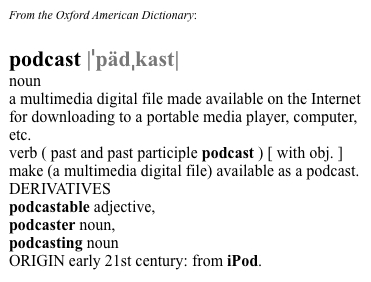
The technology for listening to these files in any kind of practical
way was not widely available until just a few years ago when
Apple's iPod hit the stores. As for recording and editing recordings,
that had long been the province of what seemed an esoteric fraternity:
those guys with huge earphones clapped around their skulls who
spend their days locked into in sound-proof rooms, fiddling with
dials and switches, and all the while (one imagines), hanging
out with famous interviewees or, maybe guitarists in mutton chops
and leather vests. As for reading a novel aloud for a casette
or CD? Wasn't that the province of professional actors and voiceover
artists? Well, the gates have been flung open as the technology
for both listening to and making podcasts is now accessible,
both economically and practically, to almost anyone with an Internet
connection.
I am not a super-techie person; I'm a literary writer. So how
did I end up podcasting, offering a workshop on podcasting, and
now turning that into this ebook?
Without intending to, I dove
headfirst into podcasting in 2009. All I wanted to do was make
available on-line a recording of my
lecture at the Library of Congress about the original archival
research behind my novel, The
Last Prince of the Mexican Empire. The novel is closely
based on such a strange story—a half-American toddler made
heir presumptive to the throne of Mexico—and one lost in
archives and so obscured behind a mist of prejudice and more
than 150 years of misunderstandings, that I feared many people,
including professional historians, would have a hard time taking
the story seriously. But hey, a lecture on my original archival
research at the Library of Congress! The head of the Hispanic
Division herself there asking questions! Wouldn't that get people's
beanies twirling!
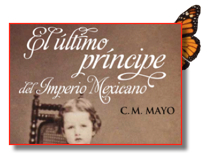 I did it again with my lecture about
the Mexican prince's Washingtonian roots at the Historical
Society of Washington DC. I did it again with my lecture about
the Mexican prince's Washingtonian roots at the Historical
Society of Washington DC.
And then a little while later, when I was on
a panel on "The Writing Life" at the Artlantic Festival
conference at the Writer's Center near Washington DC, I thought,
shoot, why not record this, too? I brought along my digital recorder
and of course, first asked the other writers, the moderator,
the organizers, do you mind? Unanimous delight.
Shortly thereafter, when I was invited to give a talk, "Twelve
Tips to Help You Hang in There and Finish Your Novel"
for the Writer's Center's Leesburg First Friday series in Virginia,
same thing: I brought a recorder. No problem. I added that podcast
to my writing workshop page,
thinking it might prove helpful to my students— and anyone
else who surfed on in.
Then it occurred to me that I
could make yet another podcast by simply reading an excerpt from
my travel memoir of Mexico's Baja California peninsula, Miraculous Air.
I already had a video trailer and a webpage for that book; wouldn't
a podcast be a fun way to help promote it? Bingo, in a matter
of a couple of weeks, one of the podcasts had 50 downloads and
the other—I'm still not sure why, though I suspect some
mentions on a listserv— over 1,500 downloads.
Over the next several months,
I continued making more podcasts, learning to edit (roughly),
to splice in clips of music and sounds, and figuring out how
to deal with this eye-crossing thing called RSS feed. On my main
website, www.cmmayo.com, I created
a podcast page for 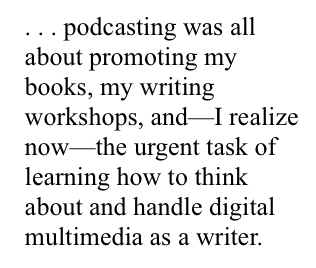 Miraculous Air; another
for the Spanish version of my novel, El
último príncipe del Imperio Mexicano; and
yet another for my collection of 24 Mexican writers on Mexico,
Mexico: A Traveler's Literary
Companion. So up until this point, podcasting was all
about promoting my books, my writing workshops, and—I realize
now—the urgent task of learning how to think about and handle
digital multimedia as a writer. Miraculous Air; another
for the Spanish version of my novel, El
último príncipe del Imperio Mexicano; and
yet another for my collection of 24 Mexican writers on Mexico,
Mexico: A Traveler's Literary
Companion. So up until this point, podcasting was all
about promoting my books, my writing workshops, and—I realize
now—the urgent task of learning how to think about and handle
digital multimedia as a writer.
In the fall of 2011, I had an epiphany.
But first a little background. After writing Miraculous Air,
a memoir of my travels through Baja California's remote desert
oases and valleys, interspersed with research and interviews—all
a joy for me to do—I wanted to write another, this one about
Far West Texas. But I knew, alas, that no matter how good it
is, as any literary agent will tell you, selling a travel memoir
to a commercial publisher may not be trying squeeze blood out
of a turnip, but it's darned close. (If you've been to a writers
conference or read some "how to" books on publishing
nonfiction, they'll tell you to first whip up a book proposal.
That's a good approach for most commercial nonfiction, but not
literary travel memoir.)
 I
really really really wanted to write about Far West Texas, however,
so I pondered and pondered, how to build some serious interest
in it before bringing the manuscript to my agent? Of course,
because I'd done it for Miraculous Air by placing articles
in the Los Angeles Times, Wall Street Journal, and
various literary magazines, that did occur to me. But today,
as a strategy for making the book salable, this only goes so
far… and not necessarily very. I
really really really wanted to write about Far West Texas, however,
so I pondered and pondered, how to build some serious interest
in it before bringing the manuscript to my agent? Of course,
because I'd done it for Miraculous Air by placing articles
in the Los Angeles Times, Wall Street Journal, and
various literary magazines, that did occur to me. But today,
as a strategy for making the book salable, this only goes so
far… and not necessarily very.
What could attract readers to my website, to my work, to sign
up for my newsletter as I was writing the book? Podcasts!
I would be interviewing people anyway, so why not share some
of those recordings en route? Rather than flesh out the
idea out on paper, I sat down at my laptop and, in a single Saturday,
made a website. I called it Marfa
Mondays Podcasting Project 2012-2013: Exploring Marfa, Texas
& Environs in 24 Podcasts.
It was a watershed moment for me as a writer. You see, I'd grown
up in a world without the Internet: athough I was early to start
using e-mail in the mid-1990s and to make my webpage, in 1999,
these things came along more than a decade after I'd finished
college. My concept of what it meant to be a writer was straight
out of the 19th century: Dickens, Flaubert, Wharton and, continuing
the tradition into the 20th , Fitzgerald, Flannery O'Connor.
You wrote, maybe with a wordprocessor, OK, but you didn't mess
around with PR; your publisher took care of that, right? (This
ignores Walt Whitman's spectacularly shameless hucksterism, but
never mind.) Having a webpage was kind of… um… narcissistic?
And anyway, how to design one? Technically it was challenging
and a whole new profession of people was charging thousands of
dollars to design them and, in my opinion, for writers, generally
not very well. Author websites were (and many still are) confusing
to navigate, fussy, ugly, and aesthetically incongruent with
the writer's work itself. Anyway, you wouldn't guess it today
when it seems every writer has a website, blog, facebook page,
tweet feed, and opt-in newsletter, but back then, a lot of writers,
especially the older and more literary ones, pinched their noses
at anything digital.
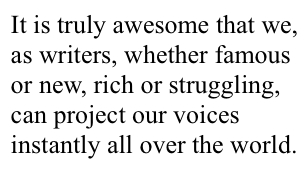 Would
Wharton have a website? Would Dickens blog? Would Flaubert tweet?
Flash forward to 2012: Like, duh. A writer is a storyteller.
A printed book—letters and images on paper, cut and sewn
and bound between covers— is just one technology, a wonderful
and enduring one, I grant you, but the printed book stands alongside
ebooks, and now that we can, by our little lonesome selves, make
podcasts, we can go, to steal the words of Captain Kirk, where
no writer has gone before. Would
Wharton have a website? Would Dickens blog? Would Flaubert tweet?
Flash forward to 2012: Like, duh. A writer is a storyteller.
A printed book—letters and images on paper, cut and sewn
and bound between covers— is just one technology, a wonderful
and enduring one, I grant you, but the printed book stands alongside
ebooks, and now that we can, by our little lonesome selves, make
podcasts, we can go, to steal the words of Captain Kirk, where
no writer has gone before.
It is truly awesome that, whether rich or struggling, famous
or new, we writers can project our voices instantly all over
the world, and available to listeners at any time.
But you don't have to be Captain Kirk. If I can podcast, so can
you. This ebook contains everything I have learned in making
more than 30 podcasts of various kinds over the past three years,
molded into an "easy peasy" 10 steps, along with some
fancy schmancy.
 By "easy
peasy" I mean, my great grandma could do this and with the
change from her grocery shopping. If she were alive. Alas, she
was born before the dawn of the 20th century. But you get what
I mean. As for money, assuming you already have a laptop and
access to the Internet, we're talking pennies, or even free. By "easy
peasy" I mean, my great grandma could do this and with the
change from her grocery shopping. If she were alive. Alas, she
was born before the dawn of the 20th century. But you get what
I mean. As for money, assuming you already have a laptop and
access to the Internet, we're talking pennies, or even free.
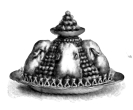 Fancy
schmancy might mean just a little souped up (Great Grandma would
want to put on her glasses and have a cup of coffee first) or
it might involve substantially more time and/or more effort and/or
more than the change from grocery shopping. Fancy
schmancy might mean just a little souped up (Great Grandma would
want to put on her glasses and have a cup of coffee first) or
it might involve substantially more time and/or more effort and/or
more than the change from grocery shopping.
OK, maybe shoe shopping. Maybe even... Italian shoe shopping.
In this ebook I treat podcasting as primarily audio. That's all
going to change, no doubt, and as it does we podcasters can surf
that wave… where it takes us. More video? Poetry-reciting
holograms? Well, nifty thing that, with podcasting, we're up
on the surf board, not hanging back on the asphalt of the parking
lot. Or imagining that it's all about tiddlywinking peas.
>Return
to TOC
|








 Would
Wharton have a website? Would Dickens blog? Would Flaubert tweet?
Flash forward to 2012: Like, duh. A writer is a storyteller.
A printed book—letters and images on paper, cut and sewn
and bound between covers— is just one technology, a wonderful
and enduring one, I grant you, but the printed book stands alongside
ebooks, and now that we can, by our little lonesome selves, make
podcasts, we can go, to steal the words of Captain Kirk, where
no writer has gone before.
Would
Wharton have a website? Would Dickens blog? Would Flaubert tweet?
Flash forward to 2012: Like, duh. A writer is a storyteller.
A printed book—letters and images on paper, cut and sewn
and bound between covers— is just one technology, a wonderful
and enduring one, I grant you, but the printed book stands alongside
ebooks, and now that we can, by our little lonesome selves, make
podcasts, we can go, to steal the words of Captain Kirk, where
no writer has gone before. By "easy
peasy" I mean, my great grandma could do this and with the
change from her grocery shopping. If she were alive. Alas, she
was born before the dawn of the 20th century. But you get what
I mean. As for money, assuming you already have a laptop and
access to the Internet, we're talking pennies, or even free.
By "easy
peasy" I mean, my great grandma could do this and with the
change from her grocery shopping. If she were alive. Alas, she
was born before the dawn of the 20th century. But you get what
I mean. As for money, assuming you already have a laptop and
access to the Internet, we're talking pennies, or even free. Fancy
schmancy might mean just a little souped up (Great Grandma would
want to put on her glasses and have a cup of coffee first) or
it might involve substantially more time and/or more effort and/or
more than the change from grocery shopping.
Fancy
schmancy might mean just a little souped up (Great Grandma would
want to put on her glasses and have a cup of coffee first) or
it might involve substantially more time and/or more effort and/or
more than the change from grocery shopping.